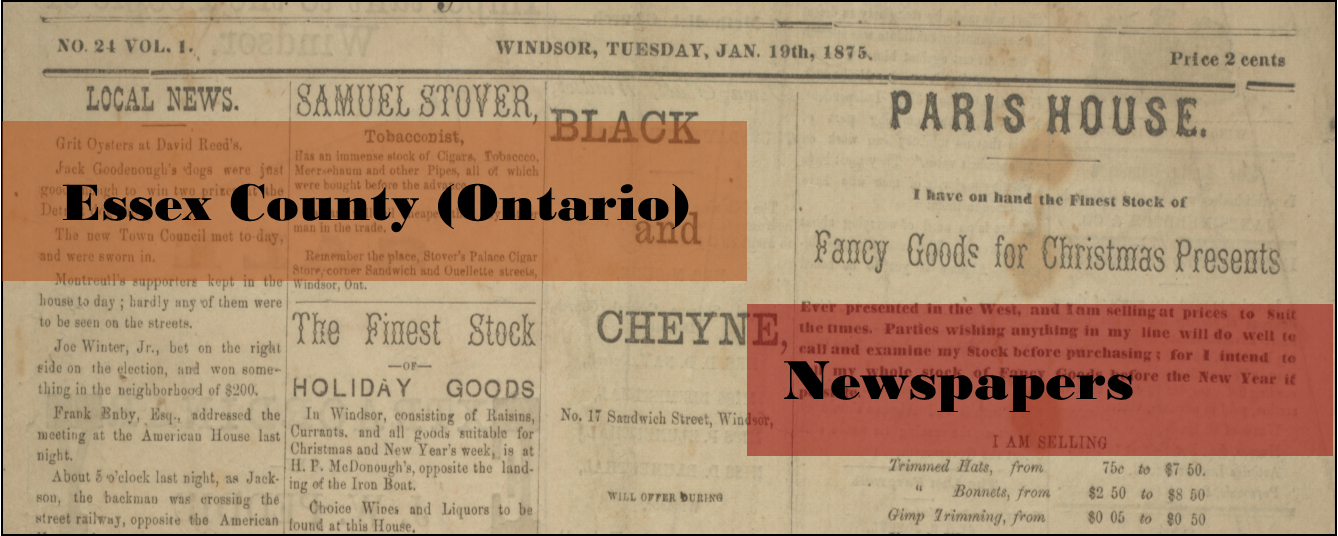
Files
Download Full Text (35.0 MB)
Place of Publication
Windsor, Ontario
Description
Publication Dates
Le Courrier d'Essex: 1884: Aug. 8 (Vol. 1: no. 1) – 1885: May ? (Vol. 2: no. ?)
Frequency
Weekly/Irregular
Online Holdings
Le Courrier d’Essex
1884: Aug. 8 (Vol. 1: no. 1) 4p.
1884: Sept. 5 (Vol. 1: no. 5) 4p.
1884: Sept. 25 (Vol. 1: no. 8) 4p.
1884: Oct. 23 (Vol. 1: no. 11) 4p.
1885: Jan. 17 (Vol. 2: no. 8) 12p.
1885: Jan. 24? (Vol. 2: no. 9) p. 5? only
1885: Feb. 14? (Vol. 2: no. ?) p. 5? only
1885: Mar. 14? (Vol. 2: no. ?) p. 5? only
1885: Mar. 28? (Vol. 2: no. ?) Supplement p. 18? only
1885: Apr, 25? (Vol. 2: no. ?) p. 8? only
1885: May 9? (Vol. 2: no. ?) p. 5? and p. 7? only
1885: May 14? (Vol. 2: no. ?) p. 7? Only
Keywords
Le Courrier d'Essex (Windsor), Newspapers, Windsor (Ontario), Essex County (Ontario)
Disciplines
Canadian History | Public History
Rights
Public Domain


Comments/Notes
Description
Le Courrier d'Essex (Windsor), later entitled Le Courrier de l'Ouest (Windsor/Detroit), was a French language newspaper that was published between August 8th, 1884 and mid 1886. In theory, it appeared weekly, but in practice, was somewhat irregular due to production problems. It was published from 13 Ouellette Avenue, Windsor and later also out of Detroit. Initially, a pre-paid subscription cost $1/year in Canada and the U.S., or 10 francs/year in France, Belgium, and Switzerland! The owner and editor was Auguste Bodard.
Auguste Bodard was born in France on February 23rd, 1853 and emigrated to Quebec on June 23rd, 1873. In 1877, he married Oliva Beaubien in Kamouraska, Quebec, and at some point in the early 1880s, they moved to Essex County. Bodard was passionate about his adopted country and made it his life's work to attract other settlers from French-speaking countries and to strengthen the French presence in Canada.
Although Le Courrier d'Essex was meant to be the "organe des populations francaises d'Ontario et de l'Ouest" (its subtitle), and have a local/regional focus, it is clear that Bodard also intended it to be a promotional tool to attract French speaking immigrants to the area, and, in general terms, to unify francophone populations around the World. In some issues, he addresses this audience directly and portrays Essex County as a sort of paradise, with "un climat delicieux. Le raisin, les peches, les poires y poussent en abondance… on laboure en mars et recolte en juillet. Les vins du comte d'Essex ont une renommee universelle…." Potential immigrants are asked to contact him for further information. (1885: December 8, page 4)
When the Courrier d’Essex began publication, it was in direct competition with Le Progres (Windsor), a well-established newspaper owned and edited by the Pacaud brothers. The Courrier d’Essex was a politically conservative, family oriented, newspaper that strongly supported the Catholic Church. Le Progres was somewhat more liberal in its outlook and politics. There were very heated exchanges between Bodard, and Aurele and Gaspard Pacaud. These were sometimes about substantive issues such as French language education rights: French only vs. bilingual/English schools. August Bodard firmly believed that the establishment of French language schools was the key to the survival of the French language and culture in the region. Unfortunately, his goals and aspirations were not shared by some francophones who wanted their children to be educated in English for reasons of economic opportunity, or who felt that the English language instruction was simply better. Bodard was very critical of these families and local officials. On page 1 of the May 7th, 1886 issue, he wrote angrily:
"Les syndics canadien d'Amherstburg ne voulant pas qu'on apprenne le francais dans les ecoles ont renvoye leurs instituteur francais et vont prendre un anglais qui rendra les canadiens "superieurs". Ce ne sont pas les syndics anglais qui ont fait le coup, ce sont les gens qui ont probablement honte de leur nationalite. Le peuple du comte d'Essex doit connaitre les noms de ces traitres: ce sont les nommes Belcourt et Robidoux."
His personal attacks often extended to the Pacaud brothers and Le Progres. There were many articles that were very acrimonious and descended into quite extreme character assassination. On the other hand, a lot of the newspaper's content was more mundane - a mixture of local and international news, advertising, poetry, and prose. There are, however, some brief accounts of contemporary events such as the Riel Rebellion.
The Courrier de l’Ouest ceased publication in the Summer of 1886, and in September 1886, Auguste Bodard moved to Montreal and became Secretary-General of the Societe d'Immigration Francaise (founded August 2nd, 1887). In 1893, he was appointed as the Canadian government's official immigration officer in Paris, France. After about 5 years, he resigned his position because he wanted to return to Canada and live the life of a settler, and support other French speaking settlers. From about 1900 onwards, he lived at Port Daniel, Quebec. Quite a lot is known about this period of his life because in 1909 he petitioned the Quebec Legislature to ask for immigration/settlement reforms and justice for colonial farmers (http://ia600806.us.archive.org/1/items/cihm_71487/cihm_71487.pdf). After a life spent championing Canada, and French immigration, he died in Montreal on July 2nd, 1915, and was buried in Notre Dame cathedral.
Updated: Katharine Ball, April 2022
Source of our Digitized Holdings
Windsor Public Library
Leddy Library, University of Windsor microfilm
To view online at the Internet Archive: https://archive.org/details/courrierdessexwindsor18841885